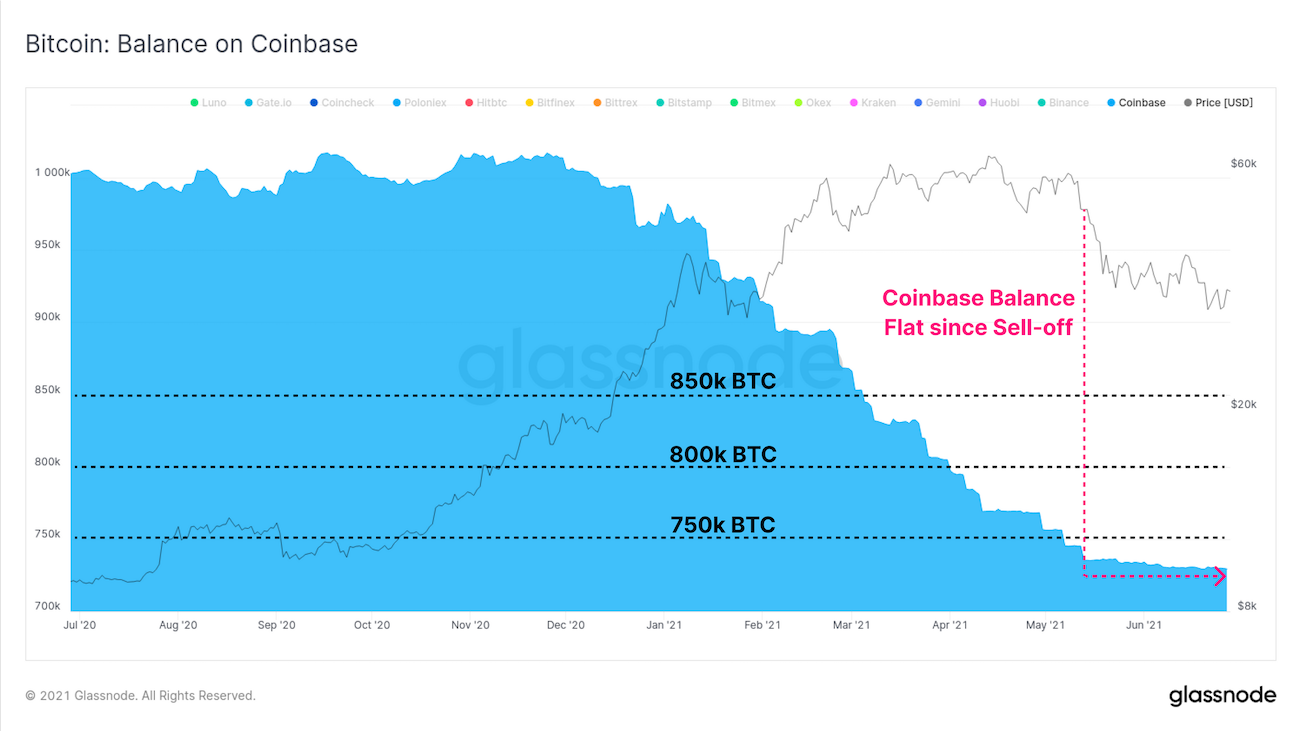
There's a 'Clearance Sale' on Bitcoin, but Institutions Aren't Rushing In
At the beginning of the year, the dominant narrative permeating cryptocurrency markets was that institutions were going to add large swaths of bitcoin to their assets. Big, established investors from hedge funds to Wall Street mainstays and blue-chip companies would be quick to jump on the bandwagon.
Now, as bitcoin (BTC) trades close to half of the all-time high of almost $65,000 reached in April, things are starting to look slightly different: Despite what looks like a clearance sale on the cryptocurrency, data shows that institutions have shown a reluctance to take advantage of the bargain, apparently rattled by the same concerns that have pushed prices down.
Bitcoin “whale” addresses – those holding 1,000 BTC or more – tumbled to about 2,150 in May from almost 2,500 in February, according to the blockchain-analysis firm Coin Metrics. Since then, the number has languished around that lower level.
Glassnode, another blockchain analysis firm, noted in a report on Monday that a stagnation in the balance of bitcoins held on the cryptocurrency exchange Coinbase offers another view of the same dynamic.
CoinDesk reported last week that open positions in bitcoin futures had tumbled by 59% from an April 13 peak, an indication that institutional investors are being cautious.
“Institutional demand appears to remain somewhat lackluster,” Glassnode wrote in its Monday report.

Chart shows flattening of bitcoin balances on the Coinbase exchange.
The latest data might show why bitcoin has been stuck between $30,000 and $40,000 for the past month, after prices had risen over the past year partly on the expectation that a wave of new buyers was set to come in.
Signs continue to mount that institutions are preparing to pounce: The likes of BlackRock, Goldman Sachs, Morgan Stanley and JPMorgan are on the list of traditional financial institutions that have set up bitcoin funds and services in the past few months or that have acknowledged considering a move into cryptocurrency. On Tuesday, financial services firm TP ICAP announced it is launching a crypto-trading platform alongside the financial heavyweights Fidelity Investments and Standard Chartered.
But nagging concerns over bitcoin’s potential environmental harm, a regulatory crackdown on bitcoin trading and mining in China and, more recently, a decline in the underlying blockchain network’s computational power appear to have given big investors pause.
Another worry is the possibility that the U.S. Federal Reserve may tighten its monetary policy in an effort to fight inflation. The prospect of fast-rising consumer prices after trillions of dollars of central bank stimulus had been a key source of demand for bitcoin, because the cryptocurrency, with its hard-coded limits on new issuance, has been cast as a steady bulwark against dollar debasement.
Cryptocurrency industry executives say they see few signs that investors are going away or liquidating en masse:
- “Despite there being a sign in the recent bear market that investors are scared off, we don’t see massive outflow from institutional users,” said Lennix Lai, director of financial markets at the cryptocurrency exchange OKEx.
- “We speak to institutional investors every day. They are still allocating funds, in record sizes,” said Jeff Dorman, chief investment officer at Arca Funds, a cryptocurrency investment firm.
- “We are on-boarding a large group of institutional firms, various hedge funds and asset managers. We see the level of interest from the traditional finance space only increasing,” said Luuk Strijers, chief commercial officer at Deribit, a crypto derivatives trading platform.
Companies slow to follow MicroStrategy’s lead
Then there are the corporations.
At the beginning of the year, MicroStrategy was the first U.S. corporation to invest its dollarized treasury in bitcoin, and CEO Michael Saylor has since been viewed as an influential presence to emerge from corporate America among the bitcoin community.
MicroStrategy’s investment kindled speculation that other big companies might follow suit. Guesses at the time pointed to Twitter, Tesla, Apple, Warren Buffett’s Berkshire Hathaway and even the burger chain Wendy’s.
MicroStrategy has kept up its buying, saying earlier this month that it is borrowing $500 million to purchase more bitcoin. And some small companies are still “active” in moving toward bitcoin, said John Todaro, vice president of crypto asset and blockchain research at Needham & Co.
But few additional big corporate buyers have materialized.
Bitcoin adoption announcements have “appeared to slow for larger companies,” Todaro said.
DISCLOSURE
The leader in news and information on cryptocurrency, digital assets and the future of money, CoinDesk is a media outlet that strives for the highest journalistic standards and abides by a strict set of editorial policies. CoinDesk is an independent operating subsidiary of Digital Currency Group, which invests in cryptocurrencies and blockchain startups. As part of their compensation, certain CoinDesk employees, including editorial employees, may receive exposure to DCG equity in the form of stock appreciation rights, which vest over a multi-year period. CoinDesk journalists are not allowed to purchase stock outright in DCG.


